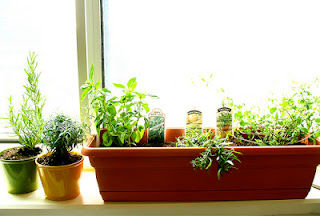Container Suggestions
Hanging baskets
Terracotta pots
Bath tubs
½ wine barrels
Wheel barrows
Old wash tubs
Glazed pots
Troughs
Large saucepans
Teapots
Polystyrene boxes
Old tins
Jam Jars
Make sure there is plenty of drainage holes in pots and containers used for your herbs.
Growing Herbs in Pots Outdoors
Growing herbs in pots or containers is easy if you follow these simple guidelines:
- In the bottom of each pot or container, add about an inch of gravel. What this will do is enhance drainage and prevent the roots from getting root rot if you water them too much.
- Water them more often than plants that are planted in a garden. This means that if you can water them two times a day, they may do a lot better than with only one watering.
- Don’t put the container on top of cement. For example, don’t line your sidewalk with pots. Cement gets pretty hot , and that heat will get transferred to the soil in the pot. It’s easy to burn out the plant if herbs grown in containers are placed on hot cement.
- Feel free to move the containers around to better places in your yard. Treat the plant as if it were your little child or pet, and learn to look for signs of stress. One type of stress is not enough sunlight. Are you placing the containers in a location outside in your yard that gets morning sunshine or evening sunshine? The different times of day can affect your plant’s growth.
- Bring in all herbs before the first frost. This is most important for tarragon and mint. Chives are another type of herb that really will benefit from this strategy. These herbs go dormant for a period of time and then once the springtime comes, you’ll have rapid, fresh new growth.
- Periodically, do add plant food - every 2-3 weeks OR a slow release fertiliser that will last the whole Summer.
- At the end of the season, know that the annual plants will be saying goodbye to you forever. They won’t be back next year. So harvest them and thank them for all their goodness. Prune the perennial plants so they will spring back in a few months.

Growing Herbs in Pots Indoors
Growing herbs in pots or containers can also be done inside the comforts of your own home. This is the best of all, because while you’re cooking, you can easily snip off a sprig of fresh parsley for garnishing a tasty entrée, or get a few tablespoons of fresh coriander for homemade salsa and chips. If you grow herbs in pots indoors, here are a few guidelines that will make it easier:
- Before you decide to grow herbs indoors, carefully evaluate your kitchen. Does it get enough sun?
- Knowing what to put the herbs in is also a big decision. You can try window boxes, hanging baskets, or inside pots and containers stacked on a metal rack that is beautifully decorated.
- Just as herbs planted in containers outdoors, you will still need about an inch of gravel lining the pot for excellent drainage.
- The type of soil you need for indoor herb plants is not the same as what’s out in the vegetable garden. For example, it wouldn’t work to scoop out garden soil and put it in a pot. The best soil is 2 parts sterilized potting soil: 1 part coarse sand or perlite. This should be used in containers outside the house as well.
- Adding a teaspoon lime can “sweeten the soil” for the herbs. That dosage is for a 5-inch pot of soil.
- Herbs indoors will need to be watered. Twice daily is best. If the top 1 - 2 cm or so has dried out, water. Try misting them for that outdoor experience. They will love you for it.
- Just because an herb is planted inside away from harsh thunderstorms and flooding doesn’t mean that it will live forever. Annuals live for only one year. Harvest them from your containers; bundle them and dry them from the ceiling or dehydrate them. Perennials will be back next year but still need pruning.
- Indoor herbs will rarely be as vigorous as outdoor herbs, so be gentle when harvesting - pick a few leaves here & there, rather than denuding the whole plant.
Happy Grubbing
Tam


No comments:
Post a Comment